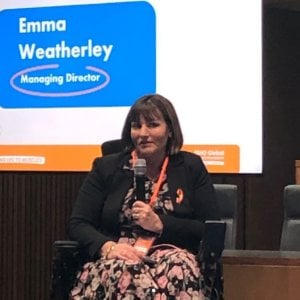Grounded by weight: Virgin Australia denies woman’s flight due to 'heavy' wheelchair
- Replies 5
In a world where we pride ourselves on advancements in accessibility and inclusivity, it's disheartening to hear stories that remind us we still have a long way to go.
Recently, a mum faced a situation that highlights the challenges people with disabilities encounter in their daily lives, particularly when it comes to air travel.
Emma Weatherley, who has been wheelchair-bound for a decade, was turned away from a Virgin Australia flight operated by Link Airways on February 29, because her motorised wheelchair was deemed 'too heavy'.
She is suffering from facioscapulohumeral dystrophy (FSHD), a progressive muscular disease that causes a person’s muscle to degenerate.
Despite having flown before and her wheelchair meeting aircraft-approved specifications, she was informed that her 190kg chair exceeded the plane's 120kg weight limit.
This incident not only caused inconvenience, but also raised questions about the consistency of airline policies, and the treatment of passengers with disabilities.

Weatherley, the Managing Director of FSHD Global Research Foundation, frequently travels and indicated that her mobility details were retained within the airline's database, emphasising that no weight limit was specified in any of the airline's promotional materials.
Virgin Australia's response, while apologetic, pointed to a mistake by a staff member, and procedural errors during Weatherley's previous flight.
The airline refunded the cost of the initial flight, and promised further training for their team members.
‘Virgin Australia takes its responsibilities to support guests travelling with specific needs, including mobility assistance, extremely seriously. We have sincerely apologised to Ms Weatherley for her experience,’ a spokesperson stated.
‘We are working both internally and with Link Airways to find a way forward on this issue, and will continue to keep Ms Weatherley updated as we seek to improve our service and processes.’
Weatherley asserted that the system unfairly disadvantages individuals with disabilities, as no direct flights were available for her from Canberra to Sydney.
Instead, she was forced for a detour through another city, such as Melbourne, incurring additional expenses from her own pocket.
Despite her capability to travel independently, her confidence was undermined, and she now harbours concerns about potential scenarios where flights are delayed, cancelled, or rerouted unexpectedly.
Furthermore, Weatherley highlighted the lack of knowledge among airline staff regarding procedures for wheelchair travellers, necessitating her to explain internal processes at the check-in desk, thereby worsening the challenges associated with air travel.
‘How do people who don’t travel a lot cope with that?’ Weatherley asked, emphasising that she is the one responsible for covering the expenses incurred from additional flights, additional accommodation, and the time lost.
‘It’s really challenging. A lot of people with disabilities just can’t afford to travel by air.’
This experience is not an isolated case.
It reflected a larger problem of accessibility in the community and the lack of awareness and preparedness to accommodate the needs of people with disabilities.
During the COVID-19 pandemic, Weatherley herself suffered a fall in a bathroom that was not equipped for her wheelchair, leading to serious injuries and surgery.
Moreover, Weatherley's condition, FSHD, is not widely known, even among medical professionals, which, according to her, could lead to ‘people falling through the cracks’.
‘There were no support groups for FSHD, no one had ever heard of it before, you’d go to visit doctors and they’d be googling it in front of you, because they didn’t know what the condition was,’ she said.
‘I lived in those gaps, I fell through the gaps myself, so I’m trying to block them up.’
As the managing director of the FSHD Global Research Foundation, she is advocating for government funding to support new treatments and trials, with more than 500 diagnosed patients ready to participate in clinical trials in Australia in the next four months.
The foundation's pre-budget submission is a call to action for $500,000 over two years to fund an information support line and more community meetings.
This funding is crucial for bridging the gaps in knowledge and support for FSHD and similar conditions.
It seems Virgin Australia is not a stranger to incidents involving passengers with disabilities and their wheelchairs.
Last year, an incident involving a doctor with disability prompted an investigation from the airline.
Another wheelchair incident, this time involving a teacher, also sparked outrage among advocates.
 Have you or someone you know encountered difficulties when travelling with a disability? What changes would you like to see implemented to make air travel more accessible for everyone? Share your stories and suggestions in the comments below.
Have you or someone you know encountered difficulties when travelling with a disability? What changes would you like to see implemented to make air travel more accessible for everyone? Share your stories and suggestions in the comments below.
Recently, a mum faced a situation that highlights the challenges people with disabilities encounter in their daily lives, particularly when it comes to air travel.
Emma Weatherley, who has been wheelchair-bound for a decade, was turned away from a Virgin Australia flight operated by Link Airways on February 29, because her motorised wheelchair was deemed 'too heavy'.
She is suffering from facioscapulohumeral dystrophy (FSHD), a progressive muscular disease that causes a person’s muscle to degenerate.
Despite having flown before and her wheelchair meeting aircraft-approved specifications, she was informed that her 190kg chair exceeded the plane's 120kg weight limit.
This incident not only caused inconvenience, but also raised questions about the consistency of airline policies, and the treatment of passengers with disabilities.

Emma Weatherley was denied boarding a Virgin Australia flight due to problems with her motorised wheelchair’s weight. Credits: Instagram / Rare Voices Australia
Weatherley, the Managing Director of FSHD Global Research Foundation, frequently travels and indicated that her mobility details were retained within the airline's database, emphasising that no weight limit was specified in any of the airline's promotional materials.
Virgin Australia's response, while apologetic, pointed to a mistake by a staff member, and procedural errors during Weatherley's previous flight.
The airline refunded the cost of the initial flight, and promised further training for their team members.
‘Virgin Australia takes its responsibilities to support guests travelling with specific needs, including mobility assistance, extremely seriously. We have sincerely apologised to Ms Weatherley for her experience,’ a spokesperson stated.
‘We are working both internally and with Link Airways to find a way forward on this issue, and will continue to keep Ms Weatherley updated as we seek to improve our service and processes.’
Weatherley asserted that the system unfairly disadvantages individuals with disabilities, as no direct flights were available for her from Canberra to Sydney.
Instead, she was forced for a detour through another city, such as Melbourne, incurring additional expenses from her own pocket.
Despite her capability to travel independently, her confidence was undermined, and she now harbours concerns about potential scenarios where flights are delayed, cancelled, or rerouted unexpectedly.
Furthermore, Weatherley highlighted the lack of knowledge among airline staff regarding procedures for wheelchair travellers, necessitating her to explain internal processes at the check-in desk, thereby worsening the challenges associated with air travel.
‘How do people who don’t travel a lot cope with that?’ Weatherley asked, emphasising that she is the one responsible for covering the expenses incurred from additional flights, additional accommodation, and the time lost.
‘It’s really challenging. A lot of people with disabilities just can’t afford to travel by air.’
This experience is not an isolated case.
It reflected a larger problem of accessibility in the community and the lack of awareness and preparedness to accommodate the needs of people with disabilities.
During the COVID-19 pandemic, Weatherley herself suffered a fall in a bathroom that was not equipped for her wheelchair, leading to serious injuries and surgery.
Moreover, Weatherley's condition, FSHD, is not widely known, even among medical professionals, which, according to her, could lead to ‘people falling through the cracks’.
‘There were no support groups for FSHD, no one had ever heard of it before, you’d go to visit doctors and they’d be googling it in front of you, because they didn’t know what the condition was,’ she said.
‘I lived in those gaps, I fell through the gaps myself, so I’m trying to block them up.’
As the managing director of the FSHD Global Research Foundation, she is advocating for government funding to support new treatments and trials, with more than 500 diagnosed patients ready to participate in clinical trials in Australia in the next four months.
The foundation's pre-budget submission is a call to action for $500,000 over two years to fund an information support line and more community meetings.
This funding is crucial for bridging the gaps in knowledge and support for FSHD and similar conditions.
It seems Virgin Australia is not a stranger to incidents involving passengers with disabilities and their wheelchairs.
Last year, an incident involving a doctor with disability prompted an investigation from the airline.
Another wheelchair incident, this time involving a teacher, also sparked outrage among advocates.
Key Takeaways
- Emma Weatherley was denied boarding a Virgin Australia flight because her wheelchair was deemed too heavy for the aircraft's weight limit.
- Weatherley, who has FSHD, had previously travelled with Virgin Australia using the same motorised wheelchair under the impression that it met aircraft specifications.
- Virgin Australia apologised for the incident, refunded the cost of the flight, and promised further training for staff and reviews of service and processes.
- Weatherley advocated for better accessibility and called for government funding to support new treatments and trials for FSHD.







